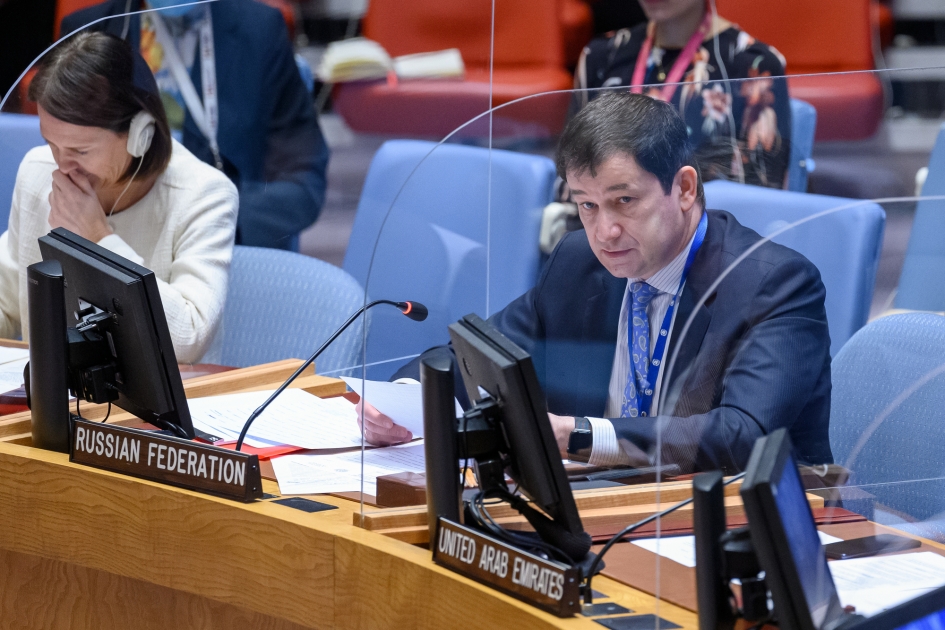Statement by First Deputy Permanent Representative Dmitry Polyanskiy at UNSC briefing on the situation in Yemen
Mme.President,
We thank Special Envoy of the Secretary-General Hans Grundberg and Under-Secretary-General Martin Griffiths for their respective reports on political and humanitarian developments in Yemen.
It is with great hopes that we are seeing progress in resolving lasting military and political crisis in Yemen that the sides have achieved under UN mediation. We welcome the long-awaited 2-month ceasefire that in particular envisages full stop of all hostilities, including airstrikes against the territory of Yemen and beyond, as well as partial reopening of the Sanaa international airport and sea ports in Hodeidah.
In this regard, we specifically commend the role of Special Envoy Grundberg, whose efforts greatly contributed to the endorsement and adoption of a ceasefire. We hope that sides will be able to prolong and expand the scope of this ceasefire once the negotiated term is over. We are convinced that such positive steps will help recover mutual trust.
We call on all sides to the Yemen confrontation to strictly observe all agreements they made and abandon any unilateral provocative steps.
We proceed from the understanding that Yemen’s long-awaited peace can be recovered only through a broad national dialogue based on due account of interests and concerns of all political forces, confessional communities, and regional groups of the country.
In this context, we note the establishment of a new collective authority – Yemen’s Presidential Council. It brings together representatives of several public and political forces of the country, and should be the main political, economic, and military governing body during the transitional period. Also, it is supposed to be in charge of security situation. This is a landmark development for the Yemeni people that resulted from political and diplomatic efforts of Saudi Arabia and the Gulf Cooperation Council.
We expect members of the Presidential Council to do their best to stabilize the situation in Yemen and bring the country back to peaceful life. This goal can be achieved only through a constructive dialogue with “Ansar Allah” movement that controls northern regions of Yemen.
In this regard, we welcome SESG’s first visit to Sanaa in his current capacity and resumption of direct dialogue with leadership of the movement. Mr.Grundberg, we also welcome your commitment to interaction with ambassadors of P5 states in Yemen. On our part, we will further work to encourage both the new Yemeni authorities and Houthis to have dialogue.
Mme.President,
We call on all sides to the internal conflict in Yemen to get back to negotiations in order to have comprehensive political settlement under UN auspices that is needed for normalization of Yemen’s humanitarian situation which remains very alarming.
We note that tankers carrying food and fuel now can enter Hodeidah ports. At the same time, we emphasize again that all restrictions on deliveries of medications and basic items to all regions of the country must be lifted. Such deliveries must run on a non-discriminatory basis. In this context, we commend continuation of financial, humanitarian, and mediator efforts of regional states that are aimed at resolving military and political crisis in Yemen. We also note the MoU between “Ansar Allah” and UN bodies that should help resolve the predicament around SAFER tanker.
We again remind of UNSC resolution 598 and other initiatives designed to bolster sub-regional stabilization, including Russia’s renewed collective security concept.
Mme.President,
Let me say in conclusion that we were not surprised by allegations of some Western states, according to which Russia’s actions in Ukraine are to blame for the looming global food crisis. We realize that it is much easier for our Western colleagues to spill such accusations rather than admit their responsibility for volatility and pessimism of global finance, food, and energy markets. This situation took years to evolve. It resulted from excessive subsidizing of Western economies, trade wars, protectionism, and illegal unilateral sanctions that affect (either directly or not) two thirds of the planet's population. Another negative aspect is the expedited energy transition that Western countries are implementing while struggling to promote their technologies. All of this had caused spikes of prices on food and energy before 2022 even started. As for the main factor of instability and forerunner of trouble, it is not Russian special military operation in Ukraine, but sanctions against our country that seek to undermine logistical chains and financial patterns used to make payments for any incoming deliveries from Russia, except for energy products that the West is interested in. So if you really want to save the world from a food crisis, revoke your sanctions of choice. Poorest countries will feel the difference momentarily. If you are not ready to do this, then give up this empty rhetoric and stop trying to confuse everyone.
Thank you.
